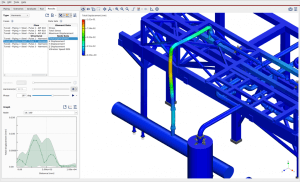
Performing Vibration Measurements: Pipe Stress Assessment
Training Courses Performing Vibration Measurements: Pipe Stress Assessment Free Course Preview Download Brochure About The Course This course teaches you all the fundamentals required for
CAESAR II is a software package for piping flexibility analysis with automated code compliance checks. It is easy to use and includes several advanced modules for specialized problems. CAESAR II can nowadays be seen as the “bread and butter” of any pipe stress engineer. This course is not only useful for beginning stress engineers but can also provide valuable knowledge for those who need to be able to interpret pipe stress results such as supervisors and technicians. The aim of our course is therefore not only to become familiar with the basic use of CAESAR II but also to create an engineering understanding of the stress results.
The course is given by one of the experienced engineers from DRG who regularly use CAESAR II for their consultancy assignments. The course incorporates several real-life examples and our experience at DRG can serve to initiate discussions about different solution methods for stress problems taking into account all engineering aspects, both theoretical as practical.
DRG/Hexagon PPM
This training is organized in cooperation with Hexagon PPM (developers of CAESAR II). The training will be presented by DRG at the DRG office, but the administration process will be handled by Hexagon PPM.
This course is scheduled over a duration of 5 work days.
This course is presented in a classroom format.
Prerequisites and level
Intended For
This course is designed for:
Not sure? Please contact us.
This is a classroom based course provided on the behalf of and in cooperation with Hexagon PPM.
Participants of the classroom course receive a personal physical certificate from Hexagon PPM upon the completion of the course.
After this course, participants are expected to:

Training Courses Performing Vibration Measurements: Pipe Stress Assessment Free Course Preview Download Brochure About The Course This course teaches you all the fundamentals required for

Training Courses Piping: Structural Integrity About The Course Enhance your expertise in addressing technical challenges on a petrochemical plant. Join our introductory level ‘Piping Structural

Training Courses Pipe Stress Analysis Free Course Preview About The Course Pipe stress engineering is a broad area of expertise. To perform a pipe stress
Laan van Oversteen 20
6th floor
2289 CX Rijswijk
The Netherlands
© Dynaflow Research Group BV